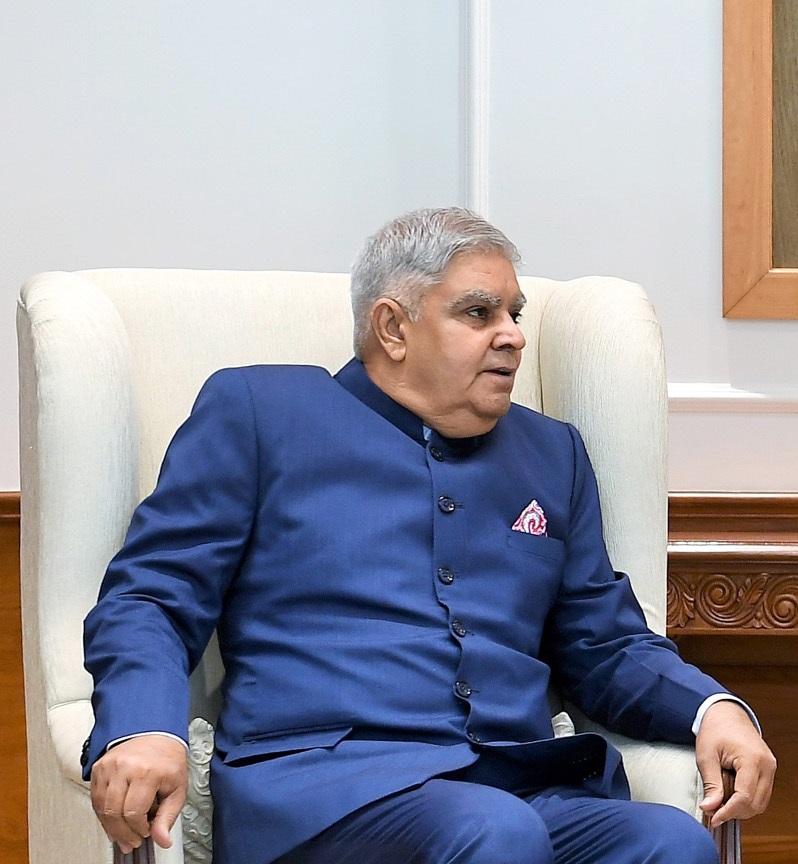VP Dhankhar Seeks Judicial Accountability Amid Cash Haul Controversy
Shri Dhankhar questioned whether internal committees of judges have any constitutional or statutory legitimacy to substitute a criminal investigation.

- Country:
- India
In a candid and impassioned address to the legal fraternity, Vice-President of India Shri Jagdeep Dhankhar on Friday raised critical questions about judicial accountability, the rule of law, and institutional integrity in light of an alleged cash seizure at the residence of a sitting judge earlier this year. Speaking at the Punjab and Haryana High Court Bar Association in Chandigarh, the Vice-President delivered a powerful indictment of the lack of investigative action into what he described as a “crime of great enormity,” and called for urgent and transparent corrective measures.
Judicial Paralysis in the Face of Crisis
The Vice-President expressed concern over a decades-old judicial order that bars the registration of a First Information Report (FIR) against a sitting judge without prior permission from the highest judicial authorities. “The Government of the day is handicapped,” Shri Dhankhar said, emphasizing that this legal barrier obstructs justice and undermines democratic accountability. “Why was that permission not granted, even after three months?” he asked, suggesting that a simple, timely nod could have initiated a vital investigation.
Shri Dhankhar questioned whether internal committees of judges have any constitutional or statutory legitimacy to substitute a criminal investigation. “If there has been a crime — a culpable act shaking the foundations of democracy — why wasn’t it punished?” he asked, expressing anguish over institutional silence.
A Temple of Justice Under Siege?
Referencing the alleged mid-March cash seizure at a judge's residence in Delhi, Shri Dhankhar painted a sobering picture of institutional vulnerability. “The judicial system is in pain,” he said. “Unexplained, unaccounted, and tainted money was reportedly found. Yet, the system didn’t move.” He noted that the information reached the public only after several days, warning that had it not surfaced, the issue may have been buried entirely.
“Where did the loose cash come from? Are there big sharks? Has this money influenced judicial work? These questions haunt not only lawyers but every citizen,” he said.
On the Role of the Judiciary and the Legal Community
While reiterating his admiration for India’s judges, whom he described as intellectually unmatched and diligent, Shri Dhankhar also stressed the immense responsibility resting on them. “Judges are reincarnations of justice, of God himself. But even they must be subject to law,” he cautioned. “No one — not even the judiciary — should be above scrutiny.”
He also underscored the significance of the legal community in safeguarding democracy, describing Bar Associations as watchdogs of constitutional integrity. “Members of the Bar have historically stood at the frontlines of India’s freedom struggle. Now, they must rise again to preserve justice and public trust.”
The Call for a Full-Fledged Investigation
Shri Dhankhar reiterated his call for an immediate, transparent, and scientific investigation into the cash haul incident. “The public deserves to know the origin, purpose, and the trail of the money. An investigation will not only bring the guilty to light but also save the reputation of many innocent individuals currently under suspicion,” he noted.
He also pointed out that unlike Presidents and Governors who enjoy constitutional immunity while in office, no such immunity extends to any other official, including judges. “In a true democracy, rule of law and equality before law must apply to all,” he said.
Legal and Moral Imperatives
Drawing inspiration from Lord Denning’s famous quote — “Be ye never so high, the law is above you” — the Vice-President reminded his audience that democratic institutions must not be allowed to weaken under the weight of unchecked power or silence. “Let us not dilute our ethical standards so low. Let us not decimate integrity,” he urged.
He referenced the Sarwan Singh v. State of Punjab case of 1957 to highlight the importance of evidence and fairness in establishing guilt: “We must treat everyone as innocent until proven guilty, but that proof must come through honest, rigorous investigation.”
Upholding Democratic Faith
Concluding his address, Shri Dhankhar voiced his belief in the strength of India’s democratic institutions but warned that public confidence is not a given — it must be earned through action. “Let the lid be blown off the can of worms,” he said. “Let skeletons come out. And let justice be served — not just for the guilty to be punished, but for faith in the Judiciary to be restored.”
In his wide-ranging remarks, the Vice-President made it clear: India's democracy stands at a crucial juncture where transparency, accountability, and the courage to confront institutional failure are no longer optional — they are necessary.
ALSO READ
Tamil Nadu Challenges Centre in Supreme Court Over Withheld Education Funds
Independence on Trial: FTC Challenges Highlight Supreme Court Precedent
Argentine Supreme Court upholds 6-year prison sentence on corruption charges for former President Cristina Fernández, reports AP.
Southern Baptists called for a gay marriage ban — urging a reversal of Supreme Court's 10-year-old ruling legalising it, reports AP.
Argentina's Supreme Court Upholds Cristina Fernández de Kirchner's Sentence










